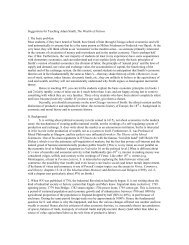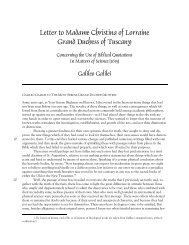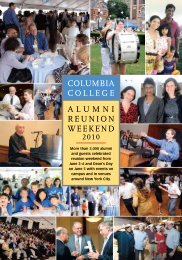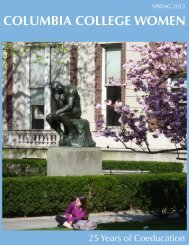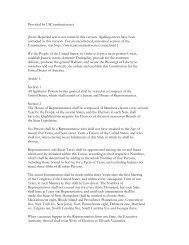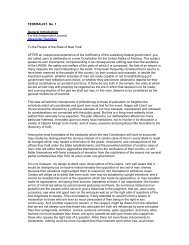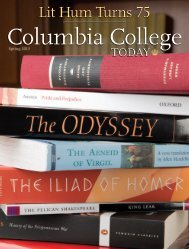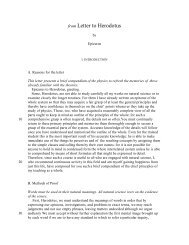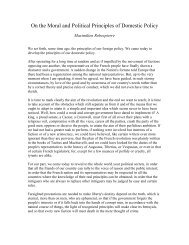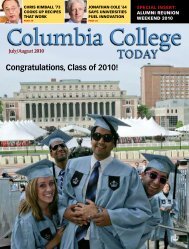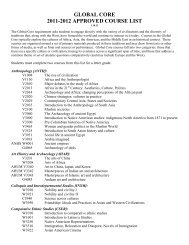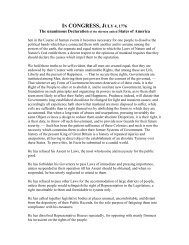Download this issue as a PDF - Columbia College - Columbia ...
Download this issue as a PDF - Columbia College - Columbia ...
Download this issue as a PDF - Columbia College - Columbia ...
Create successful ePaper yourself
Turn your PDF publications into a flip-book with our unique Google optimized e-Paper software.
CLASS NOTES<br />
COLUMBIA COLLEGE TODAY<br />
COLUMBIA COLLEGE TODAY<br />
CLASS NOTES<br />
22–6 loss at Brown, giving coach<br />
Mangurian three wins in his initial<br />
se<strong>as</strong>on <strong>as</strong> our head coach. We hope<br />
for more triumphs in 2013.<br />
On October 30, Don Mankiewicz<br />
wrote a lengthy snail mail<br />
letter that reported on his status at<br />
home in Monrovia, Calif. Don (90)<br />
is doing well, enjoying time with his<br />
wife, Carol; son, John; and adopted<br />
daughters, Jan and Sandy, whose<br />
children have made Don a happy<br />
grandfather. Don’s father, Herman<br />
Mankiewicz ’17, won an Academy<br />
Award for his screenplay of<br />
Citizen Kane, and his uncle, Joseph<br />
Mankiewicz ’28, won an Academy<br />
Award for writing and directing A<br />
Letter to Three Wives. Don himself<br />
won the Harper Prize Novel award<br />
in 1955 for his novel, Trial, and w<strong>as</strong><br />
nominated for an Academy Award<br />
for his screenplay for I Want To Live!<br />
There seems to be some genetic<br />
b<strong>as</strong>is for <strong>this</strong> multilineal transmission<br />
of genius and talent.<br />
I w<strong>as</strong> sorry to receive a note<br />
on December 7 from Betty Galen<br />
Reuther, reporting the death of<br />
her husband, Leo Reuther III,<br />
on October 19, 2012, in Flat Rock,<br />
N.C., after a short battle with<br />
pneumonia. He w<strong>as</strong> 90. I l<strong>as</strong>t heard<br />
from Leo on April 23, when he sent<br />
regrets at being unable to attend<br />
our 70th reunion luncheon on campus<br />
in June. Leo and Betty recently<br />
had moved into a new house in<br />
Flat Rock, but he w<strong>as</strong> able to enjoy<br />
it for only a few weeks before his<br />
unfortunate death. He w<strong>as</strong> buried<br />
with full military honors in Arlington<br />
National Cemetery.<br />
Leo came to <strong>Columbia</strong> from the<br />
Barnard School in New York City.<br />
He enlisted in the Army Air Corps<br />
after graduation and, following<br />
flight training in Tex<strong>as</strong> and Kans<strong>as</strong>,<br />
served <strong>as</strong> a fighter pilot in the<br />
Asiatic-Pacific Theatre, flying 142<br />
missions in P-47 and P-38 aircraft.<br />
Discharged <strong>as</strong> a captain in 1945, Leo<br />
w<strong>as</strong> awarded two Distinguished<br />
Flying Crosses, three Air Medals, a<br />
Presidential Citation and the Purple<br />
Heart. He w<strong>as</strong> one of the greatest<br />
WWII heroes among many in our<br />
cl<strong>as</strong>s.<br />
After the war, Leo joined the FBI<br />
<strong>as</strong> a special agent; he served at various<br />
stations and ended his career in<br />
1975 <strong>as</strong> supervisor in charge of major<br />
crimes and New York airports,<br />
b<strong>as</strong>ed at the FBI office in New York<br />
City. After retirement, Leo lived in<br />
Vermont and South Carolina until<br />
1999, when he moved to Flat Rock.<br />
He is survived by his wife; daughters,<br />
Loralee Neal of Longwood,<br />
Fla., and Leslie O’Keefe of Stony<br />
Point, N.Y.; and two grandchildren.<br />
At <strong>Columbia</strong>, Leo played freshman<br />
b<strong>as</strong>ketball, w<strong>as</strong> on the varsity<br />
swim team, participated in The<br />
Varsity Show and w<strong>as</strong> a member<br />
of <strong>Columbia</strong> Players, the Dolphin<br />
Society, the Newman Club and the<br />
Rifle Club. I remember Leo <strong>as</strong> an<br />
excellent student, a fine athlete, a<br />
modest hero and a loyal <strong>Columbia</strong><br />
alumnus. For myself and on behalf<br />
of Leo’s friends in our cl<strong>as</strong>s, I send<br />
condolences to Betty and their<br />
family.<br />
As 2013 reaches its midway<br />
point, I am grateful to be in touch<br />
with many <strong>Columbia</strong> friends and<br />
cl<strong>as</strong>smates (several mentioned in<br />
<strong>this</strong> column), who continue to defy<br />
their chronological age and are<br />
functioning well <strong>as</strong> they progress<br />
p<strong>as</strong>t their 90th birthdays. Ple<strong>as</strong>e<br />
send your news and comments to<br />
me at my email or home address.<br />
Your phone calls are also always<br />
welcome at 413-586-1517.<br />
As Shakespeare said in the<br />
words of King Lear, “Ripeness is<br />
all.” To which we may add: Long<br />
may <strong>Columbia</strong> stand!<br />
43<br />
G.J. D’Angio<br />
201 S. 18th St., #1818<br />
Philadelphia, PA 19103<br />
dangio@earthlink.net<br />
By the time you read <strong>this</strong>, we will<br />
have celebrated the 70th anniversary<br />
of our <strong>College</strong> graduation at<br />
Alumni Reunion Weekend with a<br />
June 1 luncheon in Hamilton Hall.<br />
I’ll report on all the good times and<br />
reminiscences in the Fall <strong>issue</strong>. The<br />
cl<strong>as</strong>s photo taken at the luncheon,<br />
however, may be found on the CCT<br />
website (college.columbia.edu/<br />
cct) <strong>as</strong> part of <strong>this</strong> <strong>issue</strong>’s reunion<br />
follow-up article.<br />
If you attended the luncheon or<br />
any other reunion events, ple<strong>as</strong>e<br />
share your thoughts and stories<br />
with me by sending a letter or email<br />
to the postal or email address at the<br />
top of the column or though CCT’s<br />
e<strong>as</strong>y-to-use webform: college.col<br />
umbia.edu/cct/submit_cl<strong>as</strong>s_note.<br />
Knowing we would encounter<br />
a delay due to CCT’s publishing<br />
schedule, I wrote a letter to cl<strong>as</strong>s -<br />
mates a while ago, encouraging<br />
them to contribute special “life<br />
updates” for <strong>this</strong> <strong>issue</strong>. Here is what<br />
I received:<br />
Cedric Philipp wrote: “Seventy<br />
years. Wow. That December I w<strong>as</strong><br />
in the Army. Commissioned in<br />
’44, I led a platoon on to Omaha<br />
Beach, some fighting in Belgium.<br />
In ’45, w<strong>as</strong> dropped into Spain,<br />
where ‘Wild Bill’ Donovan [Cl<strong>as</strong>s<br />
of 1905] suspected Hitler would try<br />
to escape. Then came nine months<br />
working under Gen. Lucius Clay in<br />
Berlin. To decompress, I drove with<br />
ex-Marine Ray Heckmann in a<br />
Jeep through South America, from<br />
Venezuela to Chile by land.<br />
“Returned to <strong>Columbia</strong> for law<br />
school. Bad job market. Then Princeton’s<br />
grad school for international<br />
affairs, the Department of State and<br />
[a career in] international pharmaceutical<br />
marketing. Married 60-plus<br />
years to the same wonderful lady,<br />
Sue; three highly accomplished<br />
kids; and three grands. A heart<br />
valve replacement, leg artery byp<strong>as</strong>s<br />
and pneumonia recently hit<br />
me at 90-plus.”<br />
Cedric noted that the likelihood<br />
of his making reunion w<strong>as</strong> remote<br />
but sent best wishes for success.<br />
From Leo Stern Jr.: “In fall 1939<br />
I began Humanities A with 20-odd<br />
other students, mainly freshmen,<br />
the cl<strong>as</strong>s instructor being Lionel<br />
Trilling [’25, ’38 GSAS]. His memorable<br />
characteristics were a chainsmoking<br />
habit and a young, wispy<br />
countenance that w<strong>as</strong> best recalled<br />
by our description, ‘m<strong>as</strong>cara blue<br />
eyes.’ At that time I had a retentive<br />
memory (long since disappeared)<br />
and could quote from Professor<br />
Trilling’s remarks in cl<strong>as</strong>s <strong>as</strong> well <strong>as</strong><br />
from our reading material. I w<strong>as</strong> delighted<br />
when I received a personal<br />
letter from him congratulating me<br />
on my final exam paper but highly<br />
embarr<strong>as</strong>sed when he chose to read<br />
it to the cl<strong>as</strong>s <strong>as</strong> an example of dutiful<br />
recall of his lectures. My wife<br />
carefully filed it on our bookshelves.<br />
“Trilling w<strong>as</strong> fond of referring<br />
to Dante’s Inferno and its narrator,<br />
Virgil, who, at the middle of his life,<br />
w<strong>as</strong> aged 35. ‘The years of our life<br />
are three score and ten,’ says the<br />
Bible. Trilling wrote a novel, The<br />
Middle of the Journey, the protagonist<br />
being 35. F<strong>as</strong>t forward to Trilling’s<br />
obituary in 1974. My wife produced<br />
our carefully filed letter and examined<br />
the date. Lionel Trilling died at<br />
70 and wrote the letter to me at 35!”<br />
Dr. Felix Demartini ’46 P&S<br />
graciously called to say he could not<br />
be present for the reunion luncheon.<br />
During the conversation, he recalled<br />
his <strong>College</strong>, P&S and subsequent<br />
years with nostalgic affection. Lou<br />
Little, the football coach at the time,<br />
w<strong>as</strong> one of the many <strong>Columbia</strong><br />
mentors to whom Felix considers<br />
himself indebted. Little w<strong>as</strong> more<br />
than a football coach. He w<strong>as</strong> a man<br />
who took a fatherly interest in his<br />
young squad members and taught<br />
them important life lessons —<br />
among them, that winning is fine,<br />
but the way one plays the game is<br />
what’s important. Little remained a<br />
friend and adviser long after Felix<br />
graduated.<br />
Felix became the CEO of<br />
NewYork-Presbyterian Hospital<br />
and is an emeritus professor of<br />
internal medicine at P&S. He h<strong>as</strong><br />
lived in Florida since his retirement<br />
several years ago.<br />
Dr. Thom<strong>as</strong> C. Catalano sent<br />
greetings, writing, “My four years<br />
at <strong>Columbia</strong> were incredibly stimulating<br />
and then, by grace of Uncle<br />
Sam, I w<strong>as</strong> in med school at Long<br />
Island <strong>College</strong> of Medicine. Internship<br />
and residency at St. Vincent’s<br />
Hospital in NYC, followed by a Damon<br />
Runyon Fellowship. I found<br />
time during all <strong>this</strong> to marry the<br />
lovely Geraldine Morrell Caruso.<br />
“I w<strong>as</strong> recalled to the Air Force<br />
in 1950 during the Korean War and<br />
served at Keesler AFB in Biloxi,<br />
Miss. … After being discharged,<br />
I moved with my family to Long<br />
Island, where I practiced medicine<br />
for 41 years in partnership with Dr.<br />
William Walker. My wife and I have<br />
three children: Our son and oldest is<br />
a lawyer practicing in Jericho, N.Y.;<br />
our older daughter is an R.N.; and<br />
our younger daughter worked <strong>as</strong> a<br />
reinsurance broker. Five grandchildren<br />
and six great-grandchildren<br />
later, our three children live near us<br />
on the Island, with the grands and<br />
greats scattered about.<br />
“During the ’60s, ’70s and ’80s I<br />
w<strong>as</strong> president of the medical board<br />
and director of medicine at Syosset<br />
Hospital, president of the N<strong>as</strong>sau<br />
Hospital Medical Staff Organization<br />
and a member of its medical<br />
board. I also w<strong>as</strong> <strong>as</strong>sistant professor<br />
of clinical medicine at Stony<br />
Brook School of Medicine. Another<br />
thing of which I am proud is my<br />
<strong>as</strong>sociation with a group of doctors<br />
and others at Northrop-Grumman<br />
who prepared the <strong>as</strong>tronaut team<br />
for <strong>as</strong>cent in the module.<br />
“We have traveled extensively in<br />
Europe and enjoyed many winters<br />
in our home in the Virgin Islands<br />
and then in Florida. The limitations<br />
of age have kept us at home <strong>this</strong><br />
year, where we are blessed with<br />
wonderful help and our nearby<br />
solicitous family.”<br />
From Bernard Weisberger:<br />
“Where have the l<strong>as</strong>t 70 years gone<br />
Here’s how, for me: Right after<br />
Pearl Harbor I began seven months<br />
of intensive Japanese language<br />
study on campus; from there, went<br />
straight into the Army’s top-secret<br />
Signal Intelligence Service for more<br />
training in translating intercepted<br />
and decoded Japanese radio messages,<br />
which I spent the war doing<br />
in W<strong>as</strong>hington, D.C., New Delhi<br />
and finally Kunming, China. Back<br />
home in March 1945, I migrated<br />
westward and, thanks to the everblessed<br />
G.I. Bill, earned a history<br />
Ph.D. at Chicago.<br />
“Onward and upward: I spent<br />
16 years (1952–68) <strong>as</strong> an academic<br />
rolling stone, teaching at Antioch,<br />
Wayne State and the Universities<br />
of Chicago and Rochester. In those<br />
years I married, fathered three children<br />
and published the first few<br />
of 17 books, some for cl<strong>as</strong>srooms<br />
and academic peers, more (my<br />
favorites) aimed at general audiences.<br />
‘Dropped out’ for four years<br />
of freelancing and working <strong>as</strong> an<br />
editor at American Heritage, during<br />
which time got divorced and<br />
moved back to New York. Finished<br />
off my academic life with part-time<br />
teaching at V<strong>as</strong>sar until 1980. Since<br />
then, I’ve lived by my freelancer’s<br />
wits, aided after 1987 by Social<br />
Security and TIAA-CREF.<br />
“In 1981 and 1982 I got lucky<br />
when I w<strong>as</strong> introduced successively<br />
to Bill Moyers and Ken Burns,<br />
both of whom I’ve intermittently<br />
worked for <strong>as</strong> historian and writer<br />
for their documentaries. Learning<br />
to write for TV w<strong>as</strong> a great, rejuvenating<br />
experience.<br />
“Midwest, ho! I moved again<br />
to the Chicago area in 1990 to be<br />
near the first of my eventual six<br />
grandchildren. And I got happily<br />
remarried. I’ve had a lucky and<br />
satisfying life, so thank you, <strong>Columbia</strong>,<br />
especially for Contemporary<br />
Civilization and Humanities A<br />
and B, the foundation stones of all I<br />
know, believe and have done.”<br />
Dr. G.J. D’Angio: “It h<strong>as</strong> been<br />
a wonderful 70 years. People<br />
actually paid me to do what I<br />
wanted and have fun doing it! I am<br />
forever grateful for our great Core<br />
Curriculum, where my education<br />
really started. I left <strong>Columbia</strong> in<br />
1942 to attend Harvard Medical<br />
School. The war ended during<br />
my surgical internship. Two years<br />
with the Army Air Corps in Japan<br />
followed; then to the University<br />
of Florence — thanks, G.I. Bill —<br />
for immersion in Italian art and<br />
history. Tuberculosis interrupted<br />
my medical training but eventually<br />
I became a pediatric radiation<br />
oncologist. Having published<br />
and lectured widely on childhood<br />
cancer, I became known: received<br />
an honorary degree (Bologna) and<br />
fellowships (London, Prague, et<br />
al), gold medals and so forth — all<br />
that offset by deflationary chagrin<br />
when I bit off more than I could<br />
chew.<br />
“My first wife, nursing educator<br />
Jean Chittenden Terhune R.N.,<br />
B.S., and I had two sons. One is a<br />
professor of pediatrics (University<br />
of Rochester) and the other an<br />
Episcopal priest. One of my two<br />
granddaughters also is an Episcopal<br />
priest (and married to one). She<br />
will make me a great-grandfather<br />
in July. The other granddaughter is<br />
an outdoor life and lore instructor<br />
in South Carolina.<br />
“Jean died in 2004. I then married<br />
Dr. Audrey Evans, with whom I<br />
had worked, often at a distance,<br />
since we met in 1955. Audrey is<br />
English and an internationally<br />
famed pediatric oncologist. She also<br />
originated the successful Ronald<br />
McDonald Houses — ‘homes away<br />
from home’ — for the families of<br />
children in-hospital or requiring<br />
repeated outpatient visits. There are<br />
now more than 300 worldwide.<br />
“I fully retired l<strong>as</strong>t September;<br />
Audrey a few years back. Aside<br />
from deafness, I am in excellent<br />
health. Audrey also is well and is<br />
active in church and community<br />
affairs. We have room for guests.<br />
Come visit.”<br />
From the Spring CCT Cl<strong>as</strong>s<br />
Notes, which were not printed in<br />
that <strong>issue</strong> due to a production error:<br />
Dr. G.J. D’Angio also included<br />
<strong>this</strong> report: “Our trip to the United<br />
Kingdom in October went well. The<br />
tour of the Bangor region of North<br />
West Wales w<strong>as</strong> full of historic interest<br />
<strong>as</strong> well <strong>as</strong> very scenic. The medical<br />
meeting in London w<strong>as</strong> held in<br />
the Barbican Centre, not one of the<br />
city’s more attractive buildings. We<br />
took time from the meeting to visit<br />
the WWII underground cabinet<br />
room, where Churchill and his<br />
government were bunkered during<br />
the awful weeks and months of the<br />
Blitz. Well worth a visit.<br />
“On our return, we spent a few<br />
days with family members on<br />
Schroon Lake, north of Albany,<br />
N.Y.; thence to Rochester, N.Y., to<br />
participate in my granddaughter<br />
Sara’s ordination <strong>as</strong> a deacon of the<br />
Episcopal Church.<br />
“We had three guests for a ple<strong>as</strong>ant<br />
Thanksgiving, made even more<br />
ple<strong>as</strong>ant after a call from Sara. She<br />
told me to be ready to become a<br />
great-grandfather come July 4!”<br />
Finally, I’m saddened to report<br />
the deaths of David Norr, a financial<br />
analyst, investment adviser<br />
and CPA, Scarsdale, N.Y., on August<br />
19, 2012; Harold C. Vaughan,<br />
a retired history teacher, Fort Lee,<br />
N.J., on September 22, 2012; and<br />
Edward M. Buyer ’43E, a retired<br />
electrical engineer, Adamstown,<br />
Md., on February 4, 2012.<br />
REUNION WEEKEND<br />
MAY 29–JUNE 1, 2014<br />
ALUMNI OFFICE CONTACTS<br />
ALUMNI AFFAIRS Vanessa Scott<br />
vs2470@columbia.edu<br />
212-851-9148<br />
DEVELOPMENT Esfir Shamilova<br />
es3233@columbia.edu<br />
212-851-7833<br />
Bill Friedman<br />
833-B Heritage Hills<br />
Somers, NY 10589<br />
swf685@aol.com<br />
44<br />
Greetings from your new cl<strong>as</strong>s<br />
correspondent. I entered <strong>Columbia</strong><br />
with the Cl<strong>as</strong>s of 1944 <strong>as</strong> Seymour<br />
William Friedman and still practice<br />
law under the name of S. William<br />
Friedman. I hope to abide by the<br />
lofty standards maintained by my<br />
illustrious predecessor, Henry Rolf<br />
Hecht.<br />
I w<strong>as</strong> thinking about my <strong>Columbia</strong><br />
freshman track and cross<br />
country coach Bob Pitkin ’34, who<br />
served under head coach Carl<br />
Merner and who won the Heptagonals<br />
high jump in 1935 with a leap<br />
of 6'-2½" — a mark now eclipsed by<br />
many female high jumpers. Bob’s<br />
father w<strong>as</strong> Walter J. Pitkin, a former<br />
<strong>Columbia</strong> professor and the author<br />
of Life Begins at Forty. Paraphr<strong>as</strong>ing<br />
that title, I think an appropriately<br />
current theme for the Cl<strong>as</strong>s of 1944<br />
should be: “Life Begins at Ninety,”<br />
an age now reached, and enjoyed,<br />
by most of our surviving cl<strong>as</strong>smates.<br />
We heard from Dr. Daniel Choy<br />
’49 P&S, whose exploits in the fields<br />
of l<strong>as</strong>er research, spine surgery and<br />
medical invention are legendary.<br />
Dan and I recently discussed his<br />
memoirs, which were published in<br />
2008 <strong>as</strong> Choy’s Luck: Shanghai to New<br />
York, a Life of Inventions, Medicine,<br />
and Adventure — a book well worth<br />
reading. It convinces its readers that<br />
the old adage, “Truth is stranger<br />
than fiction,” is not just a hackneyed<br />
expression.<br />
Dan, who h<strong>as</strong> lived life to its<br />
fullest, reveals that after CC and<br />
P&S he trained in oncology at <strong>Columbia</strong><br />
and with the Air Force. Dan<br />
h<strong>as</strong> distinguished himself with<br />
numerous inventions, particularly<br />
in the field of l<strong>as</strong>er technology. He<br />
is the creator of the L<strong>as</strong>er Knife<br />
and AEROPLAST, a surgical and<br />
burn dressing sprayed from an<br />
aerosol can, primarily to be used to<br />
treat serious burns sustained from<br />
an atomic attack. He advises us<br />
that his other inventions include<br />
coronary artery l<strong>as</strong>er angiopl<strong>as</strong>ty,<br />
which byp<strong>as</strong>ses the traditional<br />
balloon method with the use of<br />
a l<strong>as</strong>er. He h<strong>as</strong> also devised an<br />
artificial heart and, in the area of<br />
orthopedics, percutaneous l<strong>as</strong>er<br />
disc decompression. He cured one<br />
of his friends of the annoying illness<br />
of tinnitus with an ingenious<br />
technique, even though he w<strong>as</strong><br />
never trained in the field of audiology.<br />
Dan h<strong>as</strong> never been tied down<br />
by traditional practices, instead<br />
invoking out-of-the-box thinking.<br />
Dan says that he is retired, but<br />
his present vigorous lifestyle leads<br />
me to conclude that his retirement<br />
life is far more active and satisfying<br />
than the lives of all non-retired<br />
scientists. More about Dan in the<br />
next <strong>issue</strong>.<br />
I have spoken several times by<br />
telephone and email with another<br />
physician cl<strong>as</strong>smate, Dr. Francis<br />
Rigney ’49 P&S, who resides in<br />
California and h<strong>as</strong> distinguished<br />
himself <strong>as</strong> a world-renowned<br />
psychiatrist. Francis is the author,<br />
with Lemuel Dougl<strong>as</strong> Smith, of<br />
The Real Bohemia: A Sociological and<br />
Psychological Study of Beats, a book<br />
about the Beat Generation published<br />
in 1961. Francis had earlier<br />
been attracted to the behavior of<br />
beatniks and had, over the course<br />
of a year, performed a variety of<br />
tests and interviews with numerous<br />
beatniks, which leads us to<br />
recall the late Jack Kerouac, one of<br />
the most famous beatniks.<br />
Among the honors enjoyed by<br />
Francis w<strong>as</strong> his designation <strong>as</strong> chairman<br />
emeritus of Raphael House in<br />
San Francisco, a multi-service shelter<br />
for homeless families. He had served<br />
with distinction <strong>as</strong> chief of staff and<br />
a member of the board of directors<br />
of California Pacific Medical Center.<br />
One of his quotes reported on the<br />
Internet is: “I’m known <strong>as</strong> having an<br />
institutional memory … I’m vitally<br />
interested in life and activities and<br />
work.”<br />
I met up recently and unexpectedly<br />
with Alan Hoffman in the<br />
oddest of places — a beauty salon<br />
in White Plains, N.Y., patronized<br />
by my wife, Linda, and by Alan’s<br />
wife, Ellie. Alan reports recent<br />
contact with Bud Harkavy.<br />
HELP SUPPORT CCT<br />
COLUMBIA COLLEGE TODAY brings you news of your<br />
alma mater and profiles of its people you won’t find anywhere<br />
else. Wherever you are — Los Angeles, Louisville, London or<br />
the Lower E<strong>as</strong>t Side — CCT is the best way to stay connected<br />
with your cl<strong>as</strong>smates and with <strong>Columbia</strong>.<br />
YOUR TAX-DEDUCTIBLE CONTRIBUTION helps make all <strong>this</strong><br />
possible. CCT remains free of charge — no donation is required<br />
to receive the magazine or to access our website (college.<br />
columbia.edu/cct). But if you choose to support us, you may<br />
do so online (college.columbia.edu/cct/giving), by phone<br />
(212-851-7852) or by mailing a check, made payable to<br />
<strong>Columbia</strong> <strong>College</strong> Today (<strong>Columbia</strong> <strong>College</strong> Today,<br />
<strong>Columbia</strong> Alumni Center, 622 W. 113th St., MC 4530, 6th Fl.,<br />
New York, NY 10025). The fiscal year ends on June 30,<br />
and all donors are recognized each fall.<br />
WE GREATLY APPRECIATE your support and <strong>as</strong>k that you stay<br />
in touch and share news at college.columbia.edu/cct/contactus.<br />
SUMMER 2013<br />
66<br />
SUMMER 2013<br />
67



